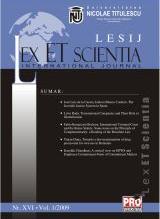ASPECTE PRIVIND LOCUL SĂVÂRŞIRII INFRACŢIUNII, CRITERIU DE DETERMINARE A COMPETENTEI TERITORIALE ÎN MATERIE PENALĂ
ASPECTS REGARDING THE PLACE OF PERPETRATION OF THE OFFENSE, A CRITERION FOR THE ESTABLISHMENT OF TERRITORIAL COMPETENCE IN CRIMINAL MATTERS
Author(s): Bogdan-Florin MicuSubject(s): Law, Constitution, Jurisprudence
Published by: Universitatea Nicolae Titulescu
Summary/Abstract: Territorial competence is, together with material competence and functional competence, one of the fundamental forms of competence, without which the precise competence of a judicial body in the resolution of a criminal matter cannot be established. Among the fundamental forms of competence, territorial competence is imperative by its extreme importance, being immutable, namely the judicial bodies can only build a case or try a criminal case if they are competent from the territorial point of view. Starting from this qualification, it is extremely important to know the criteria based on which territorial competence is established and the way in which they are enforced, aspects analyzed in this article. In the light of the Romanian criminal procedural regulations, the establishment of the territorial competence of the judicial bodies is done depending on two main coordinates – art. 30 (competence for offenses perpetrated in the country) and art. 31 (competence for offenses perpetrated abroad). The establishment of the territorial competence as a criterion for the establishment of the territorial competence in criminal matters implies the approach of both criminal law aspects and criminal procedure law aspects. Thus, from the point of view of substantial law, the appreciation of the place of perpetration of an offense is done by applying the territoriality principle. The proper enforcement of the territoriality principle in the establishment of the place of perpetration of the offense was characterized by different approaches that adopted in the criminal law doctrine several forms around which several theories have been built – the theory of action, result, unlawfulness, preponderance and ubiquity. Last but not least, from the point of view of criminal procedure law, the analysis and definition of the place of perpetration of the offense is done in accordance with the theory of ubiquity or equivalence, a dominant theory in criminal doctrine nowadays.
Journal: LESIJ - Lex ET Scientia International Journal
- Issue Year: XVI/2009
- Issue No: 1
- Page Range: 171-183
- Page Count: 13
- Language: English

